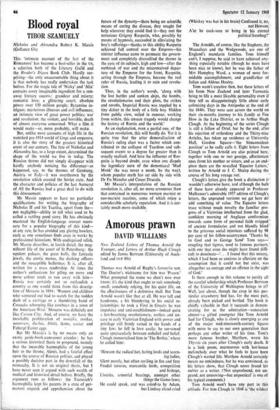Nicholas and Alexandra Robert K. Massie (Gollancz 63s) "
Blood royal
TIBOR SZAMUELY
This 'intimate account of the last of the Rnmanovs' has become a best-seller in the us, a. selection both of the Literary Guild and the Reader's Digest Book Club. Hardly sur- ptising—the only unaccountable thing about it is that nobody has really undertaken the task before. For the tragic tale of `Nicky' and 'Mx' contains every imaginable ingredient fOr a run- away literary success: grandeur and misery; romantic love; a glittering court; absolute power over 130 million people; Byzantine in- trigues; mysterious illnesses and evil influences; an intimate view of great power politics; war and revolution; the violent, and horrible, death of almost everyone concerned. What a film it *mid make—or, more probably, will make.
But, unlike most accounts of high life in the vanished pre-1914 world of kings and emperors, it is also the story of the greatest historical event of our century. The fate of Nicholas and Alexandra has, to a large extent, determined the shape of the world we live in today. The RUssian throne did not simply disappear with hardly anybody noticing the difference—as happened, say, to the thrones of Germany, Austria or Italy—it was overthrown by the revolution which created the Soviet state. And the character and policies of the last Autocrat a All the Russias had a great deal to do with this anouement.
Mr Massie appears to have no particular qualifications for writing the biography of /slicholas H and his Tsaritsa, apart from the— net negligible—ability to tell what used to be called a rattling good story. He has obviously mastered the English-language sources neces- sary for a popular biography of this kind— at any rate, he has avoided any glaring howlers, such as one sometimes finds even in works by professional historians. With undisguised relish, Mr Massie describes, in lavish detail, the mag- nihcent life of the court of St Petersburg: the opulent palaces, the great balls, the fantastic jewels, the exotic menus, the dashing officers and the susceptible ballerinas. It is, after all, written for a mass readership. At times the author's enthusiasm for piling on more and more colour tends to run away with him— Russia was certainly not so outlandish a country as one would think from this descrip- tion of Moscow in 1894: 'Women and children who ventured out had to watch for the sudden dash of a carriage or a thundering band of Cossacks whooping like cowboys in a town of the American West.' Moscow was definitely not like Carson City. And, of course, we have the inevitable proliferation of moujiks, troikas, samovars, dachas, blinis, ikons, caviar and Faberge Easter eggs.
But Mr Massie's is by no means only an exotic guide-book-cum-court circular: he has a serious historical thesis to propound, namely that the incurable haemophilia of the young heir to the throne, Alexis, had a fateful effect upon the course of Russian politics, and played a possibly decisive part in the downfall of the monarchy. It is not an original thesis, but I have never seen it argued with such wealth of medical and historical detail before. Briefly, the argument runs as follows: the Tsarevich's haemophilia kept his parents in a state of per- manent anguish and apprehension about the future of the dynasty—there being no scientific means of curing the disease, they sought for help wherever they could find it—they met the notorious Grigory Rasputin, who, possibly by means of hypnosis, succeeded in alleviating the boy's sufferings—thanks to this ability Rasputin achieved full control over the Empress—his sinister influence came to permeate the govern- ment and completely discredited the throne in the eyes of its subjects, high and low—after the outbreak of war and the misconceived depar- ture of the Emperor for the front, Rasputin, acting through the Empress, became the real ruler of Russia, leading it to ruin and revolu- tion.
Thus, in the author's words, 'along with the lost battles and sunken ships, the bombs, the revolutionaries and their plots, the strikes and revolts, imperial Russia was toppled by a tiny defect in the body of a little boy. Hidden from public view, veiled in rumour, working from within, this unseen tragedy would change the history of Russia and the world.'
As an explanation, even a partial one, of the Russian revolution, this will hardly do. Yet it is quite true that the utter demoralisation of Russia's ruling class was a factor which con- tributed to the collapse of Tsardom and sub- sequent events to a degree far greater than is usually realised. And here the influence of Ras- putin is beyond doubt, even when one dispels the legendary aura of the demoniacal 'Mad Monk' (he was never a monk, by the way), whom _popular myth has set side by side with Dr Fu Manchu and Count Dracula.
Mr Massie's interpretation of the Russian revolution is, after all, no more erroneous than that contained in numerous western marxist or neo-marxist treatises, some of which enjoy a considerable scholarly reputation. And it is cer- tainly much more readable.






























 Previous page
Previous page